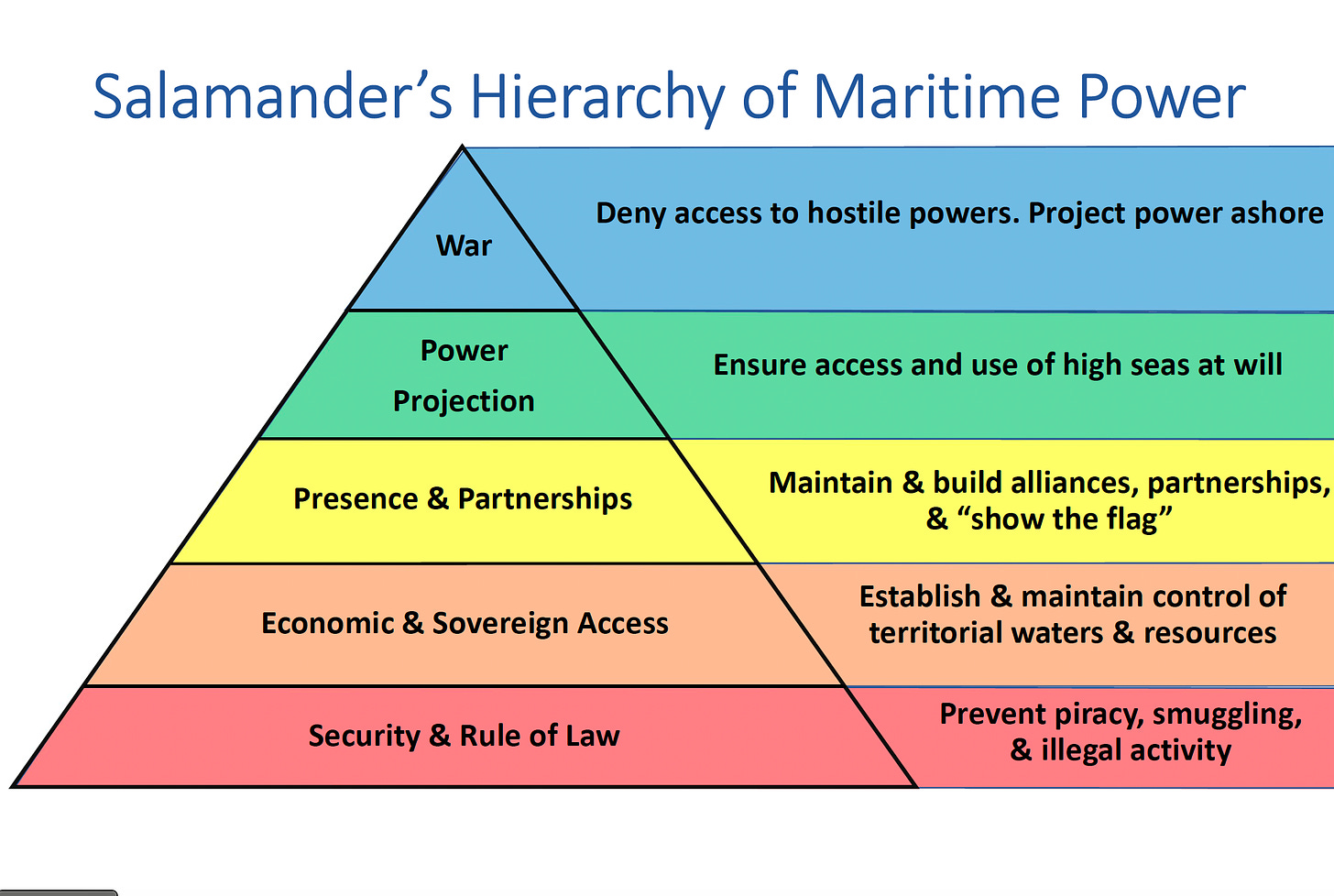Where Has Your Navy Moved on the Salamander Hierarchy of Maritime Power?
reality can be a party-pooper
It has been three years or so since I first posted this, and I think it is time to bring it up again.
In light of the extended unscheduled range time against uncooperative targets in the Red Sea, I think some of our allies need to reevaluate where their navy actually is - and as such - what real maritime power they have. Likewise, the USA needs to take a sober accounting of the utility of their allied navies in any large fight - not even considering national caveats and political agency.
Even inside national fleets, I think a few ships need to be reassessed as to what missions they can really contribute to, and even more importantly - where their navies have capability gaps.
In the US Navy, for example, we have a few months of combat in the littorals that clearly demonstrate that our few dozen Littoral Combat Ships can’t operate.
All of this needs to be remembered in the context that what we are facing in the Red Sea is at best a sub-4th rate naval power that just happens to be a quasi-piratical non-state actor. This is simply an entry level test against what are second-tier threats from that sub-4th rate naval power. The Houthi are not firing the most capable ASCM, ASBM, and attack drones available, not even close.
Print it out. Get your pens out. Put a mark where you thought your navy was in September 2023, and where you now think it is in February 2024.
Then ponder it over a 12-month or longer campaign.





Unfortunately our Navy is a result of our national policy. The Democrats place little value on a strong navy. Why? Look at the melting pot from which they come. It is in part a cultural issue where there is a tremendous difference in values, norms and priorities; i.e., social welfare programs, religious differences, muslim, vs. christian, etc.. Another "weak link" in the policy stems from their ideology which favors socialism. Our beloved navy is in the same shape as our national borders - broken.
CDR Sal, at the risk of sounding like a pandering sycophant here goes. There's a lot of thought went into this. A couple of careers ago, when I used to write scenarios for big events, we used a DIME / PMESII framework to organize our framing documents; this would fit right in. IMO this model passes the ultimate test...it is USEFUL. Any tool that the average person can use in today's world to help make sense of the tsunami of information they get bombarded with is USEFUL. Speaking for myself, of course; YMMV.
Regarding our allies and partners (with the caveat that is always an "interest of the moment" discussion, and I include NATO in that conversation), few if any can project power with any quantity and / or lengthy of time. Our own capability is diminished from years past, but as you point out is still the overwhelming preponderance of the naval power in the ME. Just as the Spanish Civil War was a precursor, battle lab and TTP developer for WW II, arguably UKR and the ME are doing the same for whatever is to come (pay attention to the Pacific, or course). Drones and swarms and exchange rates of attackers vs defensive munitions are creating threats to the naval status quo that are very troubling. Tanks vs ATGMs and aircraft vs SAMs of all types are lessons learned and TTP gold mines as well.
The electronic / space / IO side is also being closely watched by everyone, especially the Pacific. Speaking of the Pacific, looking at China, Japan, and Korea is fascinating. You have industrial capacity in all three (more than the U.S. arguably, especially in shipbuilding), intense competition economically and geographically, incredibly bad history among all three going back centuries (not just WW II !!!)...and us, perhaps being seen as a less than reliable partner than in decades past.
Japan in particular has publicly upped their game in the naval regime, not familiar with S. Korea as much anymore. While everyone appears to band together as an act of self preservation against China, I still find myself thinking about the end scene in "the Good, the Bad, and the Ugly" when the three main characters faced off in a triangle against each other. SPOILER ALERT for those who haven't seen the movie: The one who cheated the most won, perhaps there is a lesson buried in a great movie somewhere...